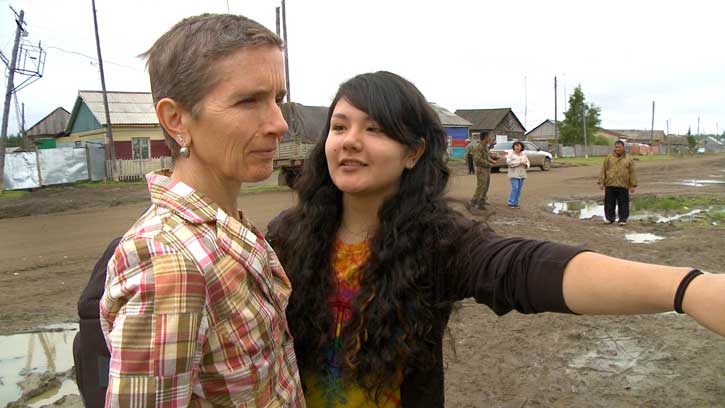
Susie Crate and her daughter Katie Yegorov-Crate in a scene from "The Anthropologist." Photo courtesy of Ironbound Films Inc.
Traveling to film festivals and taking part in Q&As isn’t a regular part of George Mason University anthropologist Susie Crate’s job, but she’s happy to do it. As the subject of the documentary, “The Anthropologist,” she hopes that sharing her work this way might contribute to the conversation about climate change and to a cultural shift as well.
“My whole intention in this is to bring people into this experience,” said Crate, who teaches in the Department of Environmental Science and Policy. “If people can’t travel to these places, we can bring places and the human experience to them.”
“The Anthropologist” will be shown from 4-6 p.m. Monday, April 17, in the Johnson Center as part of the 2017 Earth Week festivities. There will be a Q&A with Crate following the screening.
Documentary film directors Seth Kramer, Daniel A. Miller and Jeremy Newberger, of Ironbound Films, found Crate through the Arctic Social Sciences division of the National Science Foundation.
Crate was already familiar with the filmmakers’ work. She’s used their 2008 documentary, “The Linguists,” about two linguists who document disappearing languages, in her classes for several years.
The filmmakers wanted to travel with Crate, who specializes in environmental and cognitive anthropology. Since 1991, Crate has conducted research in northeastern Siberia, Russia, working with the Viliui Sakha, a Turkic-speaking horse and cattle breeding group. Since 2006 her work has focused on how climate change is affecting their livelihood and culture.
In the summer of 2010, the filmmakers travelled to Siberia with Crate and her teenage daughter, Katie Yegorov-Crate.
“That summer they realized that my daughter’s father is Viliui Sakha and that that entire side of her family is increasingly challenged by the local effects of climate change—and they said, ‘Wouldn’t it be great to have her in [the film] to get the attention of young people?’” Crate said.
After much discussion and a formal agreement to protect Katie’s rights as a minor, she became part of the documentary.
At its core “The Anthropologist” is about four women, three of them anthropologists. As viewers watch Crate and her daughter travel to Siberia, Kiribati in the South Pacific, the Peruvian Andes and the Virginia coast of the Chesapeake Bay to meet with people confronting the local effects of climate change, anthropologist (and George Mason professor emerita) Mary Catherine Bateson talks about the career of her mother, Margaret Mead, who popularized cultural anthropology in America, and discusses what an anthropologist does. Bateson was Robinson Professor of Anthropology and English at Mason until she retired in 2004.
“The Anthropologist” was named to Indiewire’s list of 10 Must-See Documentaries at DOC NYC, America’s largest documentary festival. In addition to film festivals, the documentary has been screened at universities around the country.
Crate said audiences have been genuinely moved by the film.
“I agreed to do the film because I want to make a difference. If I were going to be a ‘film star,’ this is the best reason: getting something out there that is extremely critical for the human race. We are causing climate change and we are the only ones who can turn it around.”
